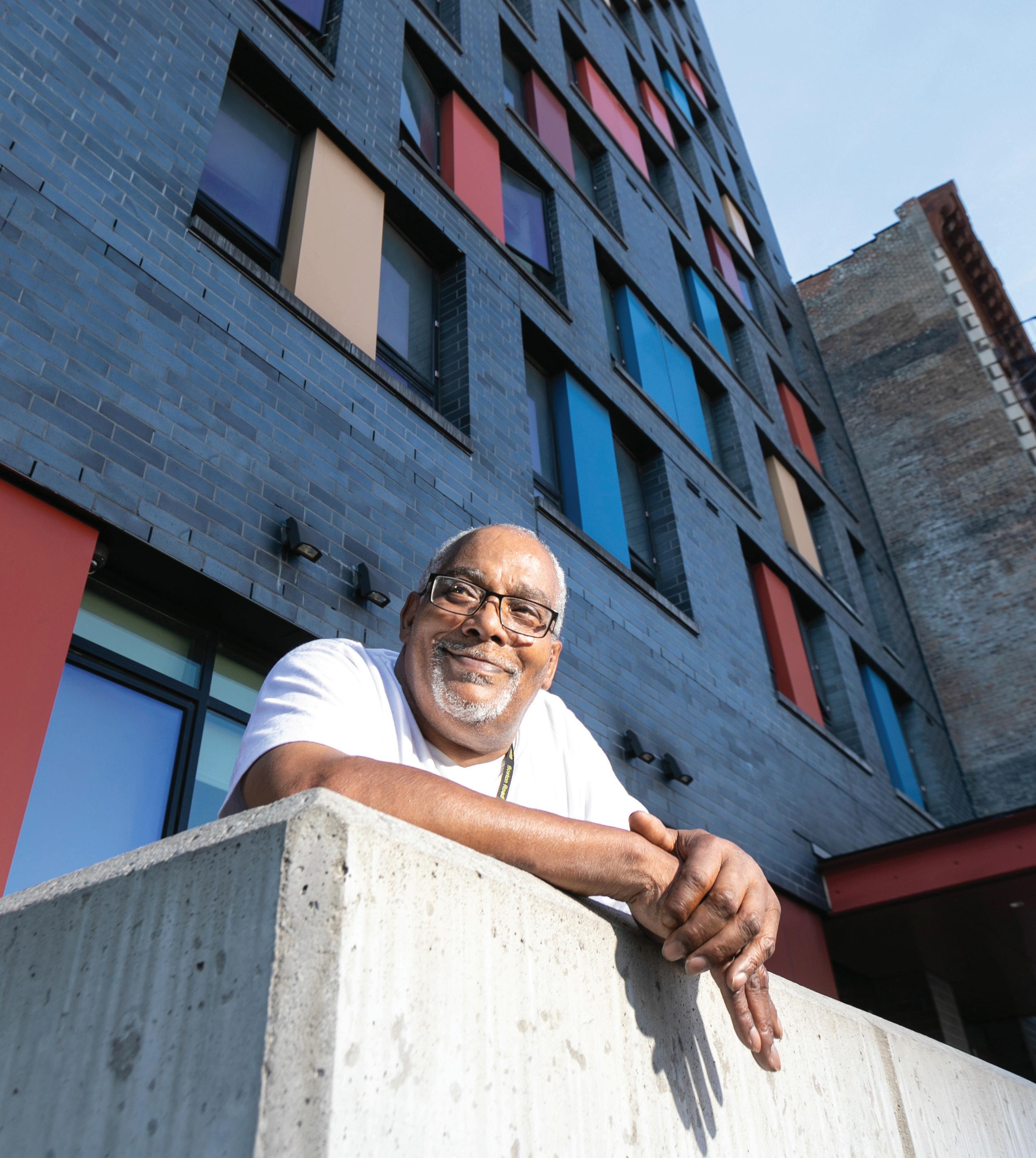
Grants FALL 2022 NEWSLETTER Finding lasting homes for all New Yorkers WHAT’S INSIDE Caring for furry and flying New Yorkers Finding joy in poetry and activism pages 10-11 page 3 pages 4-6
The New York Community Trust is a public charity and New York City’s largest community foundation.
We connect generous people and institutions with high-impact nonprofits making New York City, Long Island, and Westchester better places for all.
We build stronger communities, influence public policy, foster innovation, improve lives, and protect our environment.
We’d like to hear from you.
Please contact us with questions or comments: (212) 686-0010 or info@nyct-cfi.org
Kudos to Trust staff and board…
Trust President Amy Freitag was included in City & State’s “Nonprofit Power 100” list recently. She also was interviewed by Inside Philanthropy for a profile that was published this summer. Trust board member Fernando Bohorquez, Jr., a partner at the BakerHostetler law firm, was named to City & State’s “Power of Diversity: Latino 100” list.
Long Island Community Foundation Executive Director David Okorn was named a “Hero for Hope” by Central Nassau Guidance and Counseling Services at its 50th anniversary reception. Westchester Community Foundation Executive Director Laura Rossi was named to City & State’s “Westchester Power 100” list.
Kerry McCarthy, vice president for philanthropic initiatives, was named to Crain’s “2022 LGBTQ Notable Leaders” list, and Salem Tsegaye, program officer for arts and culture, was named to Crain’s “2022 40 Under 40” leadership list.
What we are reading and watching…
ON THE COVER: Daniel Broome, who lived on the street for five years, found a home at a supportive housing residence in the Bronx run by Breaking Ground.
We asked our staff which books and plays they recommend.
Tell Me How it Ends: An Essay in 40 Questions, by Valeria Luiselli
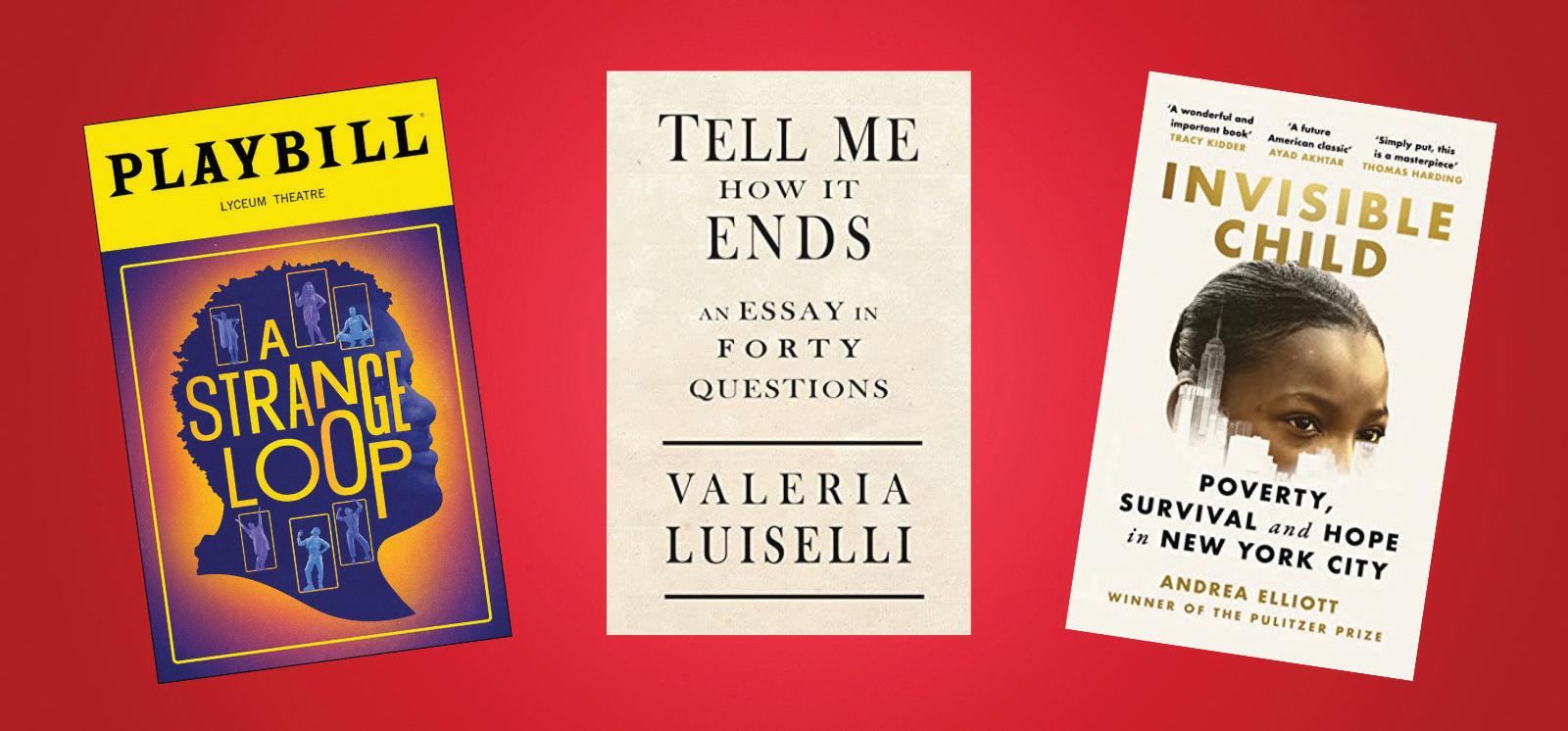
Recommended by Eve A. Stotland, senior program officer for education and human justice. “It illuminates how child immigrants get caught up in the bureaucratic labyrinth that is the New York deportation system—and the efforts of advocates and volunteers to help them find safety.”
Invisible Child, by Andrea Elliott
Recommended by Rachel Pardoe, senior program officer for older adults, people with disabilities, and animal welfare. “There is an immensely relevant through line between the narrative in this book and our slate of recent homelessness grants.”
A Strange Loop, by Michael R. Jackson
Recommended by Salem Tsegaye, program officer for arts & culture. “This funny, moving, and nuanced musical—about a Black queer man who is a Broadway usher and playwright struggling to write as he navigates his identities—was written by one of our Helen Merrill Award recipients, Michael R. Jackson. It is closing January 15th, so this is your last chance to see this critically acclaimed show, which has won a Tony for best musical and a Pulitzer for drama.”
WELCOME nycommunitytrust.org 2
Photo by Ari Mintz
Finding joy in poetry and activism
MEERA DASGUPTA
Meera Dasgupta, 18, is a former participant of grantee Girl Be Heard and a Van Lier Fellow at Urban Word. Raised in Rego Park, she was both the first Asian American and the youngest person to be chosen as United States Youth Poet Laureate.
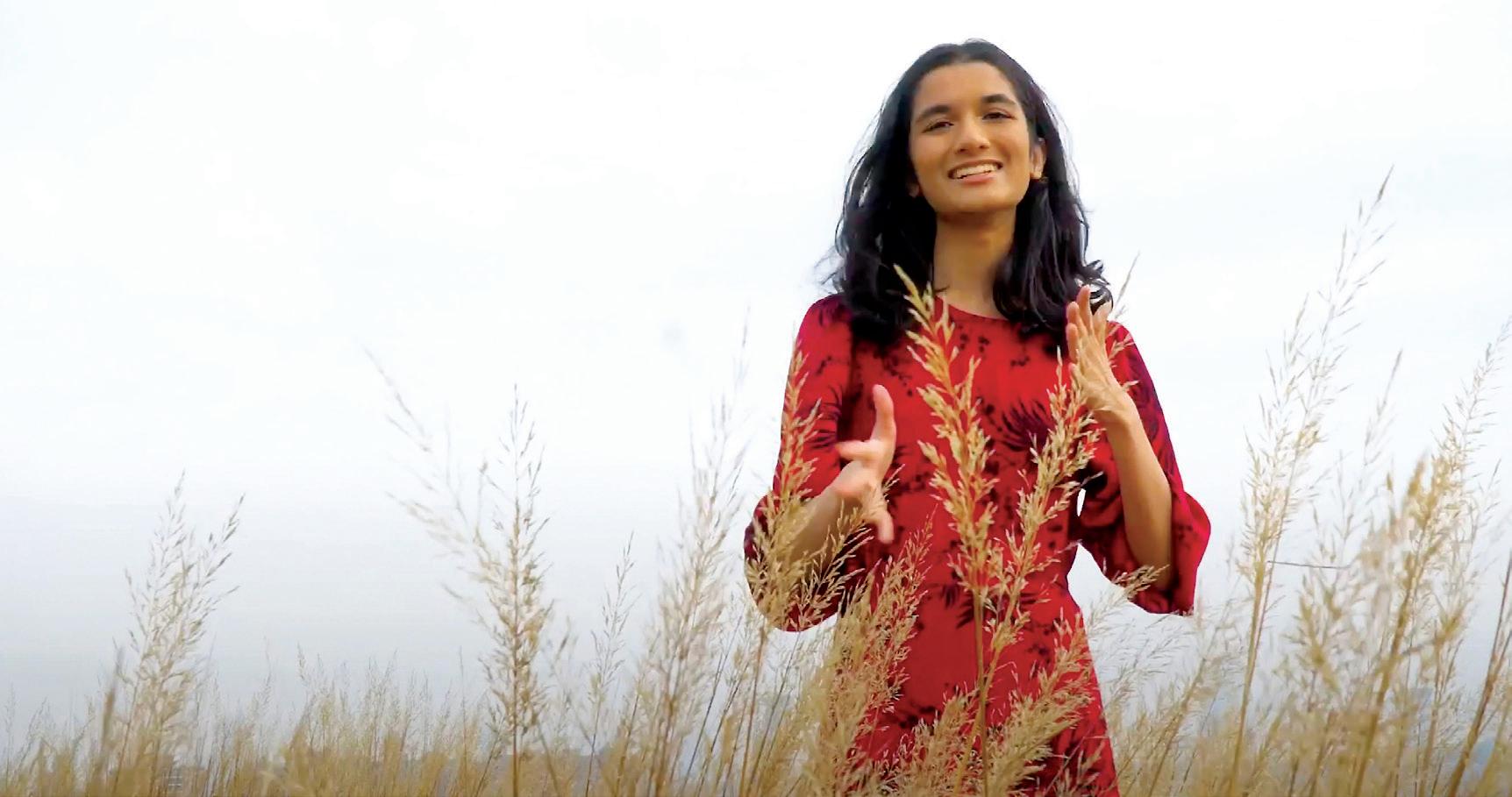
“Poetry worked with my journey in activism because I believe even one voice has the power to change minds. Because changing a single life means that you are changing the world.
In what I call “artivism,” you utilize your words and the lived experiences of the communities around you to express the emotions that often lie in tangent to the statistics about an issue such as climate change.
After I presented as a finalist at the citywide youth arts program Climate Speaks in 2019, someone from the audience told me that the words I shared made her feel braver. That resonated with me because I used to have stage fright.
Support from the communities
I found through Urban Word, Girl Be Heard, and the youth poetry communities in New York gave me the strength to get up on stage and speak about social justice issues. I found people who were just as passionate as I was about uncovering the things that often go unheard, the things that we often might not see on the news.
Being the U.S. Youth Poet Laureate in 2020 was a privilege. You have to not only see that it’s a privilege, but find ways to use it to empower those without the same privileges. I would push myself to not only find the people in the communities that I knew, but to reach people who don’t have these platforms, who do not have access to technology or the Youth Poet Laureate network.
I feel as though young people today carry the weight of the world on their shoulders—we have so many things that we continuously have to push back on to find not only a seat at the table, but to remake the table into the image of what we hope it to be.
Girl Be Heard was like a family. We not only created art together, but we found joy. We took a multitude of issues and embodied characters through a musical to showcase that even in the darkest of times you can find joy. We would discuss difficult things while at the same time there was so much laughter, so much creativity. Imagining a future—and acknowledging that in that future there is light—is the first step to walking towards it.” n
Financial information about The New York Community Trust can be obtained by contacting us at: 909 Third Avenue, 22nd Floor, New York, New York 10022, (212) 686-0010, at www.nycommunitytrust. org, or as stated below: Florida: SC No. CH9514 A COPY OF THE OFFICIAL REGISTRATION AND FINANCIAL INFORMATION MAY BE OBTAINED FROM THE DIVISION OF CONSUMER SERVICES BY CALLING TOLL-FREE, WITHIN THE STATE, 1-800-HELP-FLA OR AT www.FloridaConsumerHelp.com REGISTRATION DOES NOT IMPLY ENDORSEMENT, APPROVAL, OR RECOMMENDATION BY THE STATE. Maryland: For the cost of postage and copying, from the Secretary of State. Michigan: MICS No. 22265. Mississippi: The official registration and financial information of The New York Community Trust may be obtained from the Mississippi Secretary of State’s office by calling 1-888-236-6167. New Jersey: INFORMATION FILED WITH THE ATTORNEY GENERAL CONCERNING THIS CHARITABLE SOLICITATION AND THE PERCENTAGE OF CONTRIBUTIONS RECEIVED BY THE CHARITY DURING THE LAST REPORTING PERIOD THAT WERE DEDICATED TO THE CHARITABLE PURPOSE MAY BE OBTAINED FROM THE ATTORNEY GENERAL OF THE STATE OF NEW JERSEY BY CALLING (973) 504-6215 AND IS AVAILABLE ON THE INTERNET AT http://www.state.nj.us/lps/ca/charfrm/htm. New York: A copy of our most recent financial report is available from the Charities Registry on the New York State Attorney General’s website at www.charitiesnys.com or, upon request, by contacting the NYS Attorney General, Charities Bureau, at 120 Broadway, New York, NY 10271 or at 212-416-8401. North Carolina: Financial information about this organization and a copy of its license are available from the State Solicitation Licensing Branch at (888) 830-4989 (within N.C.) or (919) 814-5400 (outside N.C.). Pennsylvania: The official registration and financial information of The New York Community Trust may be obtained from the Pennsylvania Department of State by calling toll-free, within Pennsylvania, 1-800-732-0999. Virginia: From the State Office of Consumer Affairs in the Department of Agriculture and Consumer Affairs, P.O. Box 1163, Richmond, VA 23218. Washington: From the Charities Program at 1-800-332-4483, or www.sos.wa.gov/charities. West Virginia: West Virginia residents may obtain a summary of the registration and financial documents from the Secretary of State, State Capitol, Charleston, WV 25305. Wisconsin: A financial statement of the organization disclosing assets, liabilities, fund balances, revenue and expenses for the preceding fiscal year will be provided to any person upon request. CONTRIBUTIONS ARE DEDUCTIBLE FOR FEDERAL INCOME TAX PURPOSES IN ACCORDANCE WITH APPLICABLE LAW. REGISTRATION IN A STATE DOES NOT IMPLY ENDORSEMENT, APPROVAL,
Grants Newsletter | Fall 2022 3
FIRST PERSON
OR RECOMMENDATION OF THE NEW YORK COMMUNITY TRUST BY THE STATE.
Photo by Simbarashe Cha
Finding lasting homes for all New Yorkers
“It takes a little while to transition,” said Daniel Broome, who lived on the street for five years before living in a Bronx building created by Breaking Ground. “When I started, this was like my crash pad. Then it became my apartment. Then it became my home.”
The Trust has a long history of addressing homelessness across the five boroughs, Long Island, and Westchester. The hard-won successes of its grantees are both notable and a reminder of the tough task of helping those still living on the streets, in subways, and in shelters.
The city’s unhoused population is the highest it’s been since the Great Depression. Causes include the decline in affordable housing,
soaring rents, and individual crises such as job losses, domestic violence, and health issues. In addition, the health and economic consequences of the pandemic disproportionally hit communities of color, which were already struggling with housing insecurity.
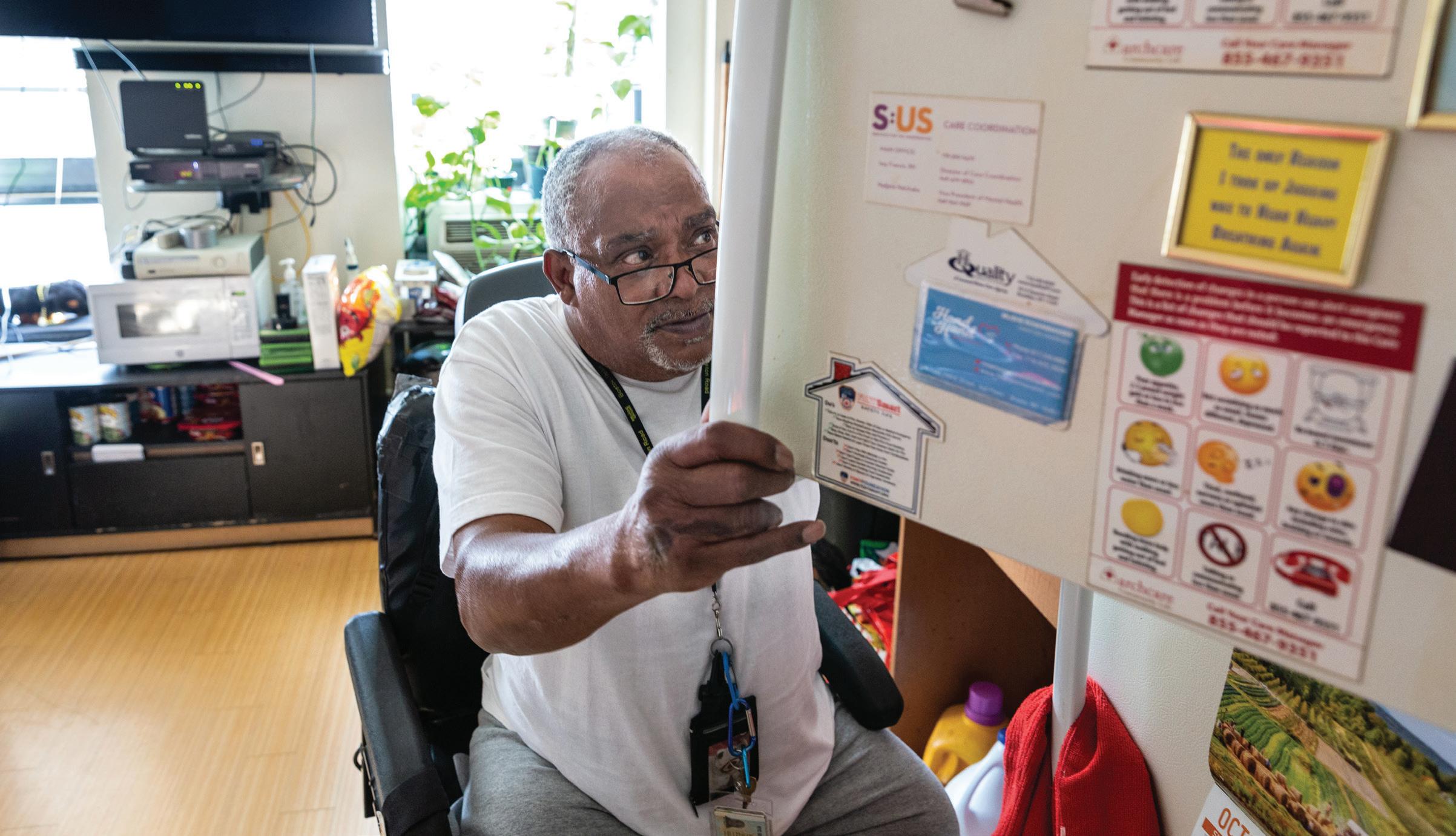
According to the Coalition for the Homeless, there were more than 63,000 people, including 20,000 children, in city shelters every day this past October. Obscured by these statistics are the stories of the sons, daughters, friends, and family members who have become unhoused.
“We are people, not just a number,” said Felix, one of the Coalition’s constituents. “I am homeless, but not hopeless.”
A GROWING CRISIS
The arrival of more than 20,000 immigrants by bus from the nation’s southern border has renewed attention to the city’s homelessness crisis and overwhelmed a system already beyond capacity. While The Trust
nycommunitytrust.org 4 SPOTLIGHT An in-depth look at issues important to New Yorkers
AT HOME: Daniel Broome, who uses a wheelchair, makes lunch in an accessible apartment run by Breaking Ground in the Bronx. Photo by Ari Mintz
There were more than 63,000 people, including 20,000 children, in city shelters every day this October.
expedited a grant to Havens Relief Fund Society to meet the basic needs of these migrants, much more must be done.
The city’s homeless population is estimated at 80,000. The average stay in the shelter system is 483 days for single adults and 520 days for families with children. Unhoused people face grave dangers—last year 16 died from exposure—and lack basic essentials. The average age of death for people without housing is 51 years old. But the difficulties can extend far beyond the physical.
“Regrettably, I lost the respect and friendship of a lot of people,” Broome recalled about his days on the streets of Bedford-Stuyvesant, his home even if there was no roof over his head. “Because their patience was short, and I can’t blame them. I got all kinds of insults. I became numb to it.”
Decades of discrimination, particularly in housing, have led to the loss of generational wealth in communities of color, which are overly represented in the unhoused population. While Black New Yorkers make up 24 percent
of the city’s population, 56 percent of the homeless population is Black. People with disabilities are also disproportionally affected: 68 percent of single adults in the system have a disability.
OUR HISTORY OF HELPING
In its earliest days, The Trust addressed poverty through grants for food, clothing, and shelter. The roots of what some call “modern homelessness” began in the 1970s with the decline in single-room occupancy units and the closing of in-patient psychiatric facilities, leading to more individuals without stable housing. Then, over the years, economic factors resulted in more families becoming homeless.
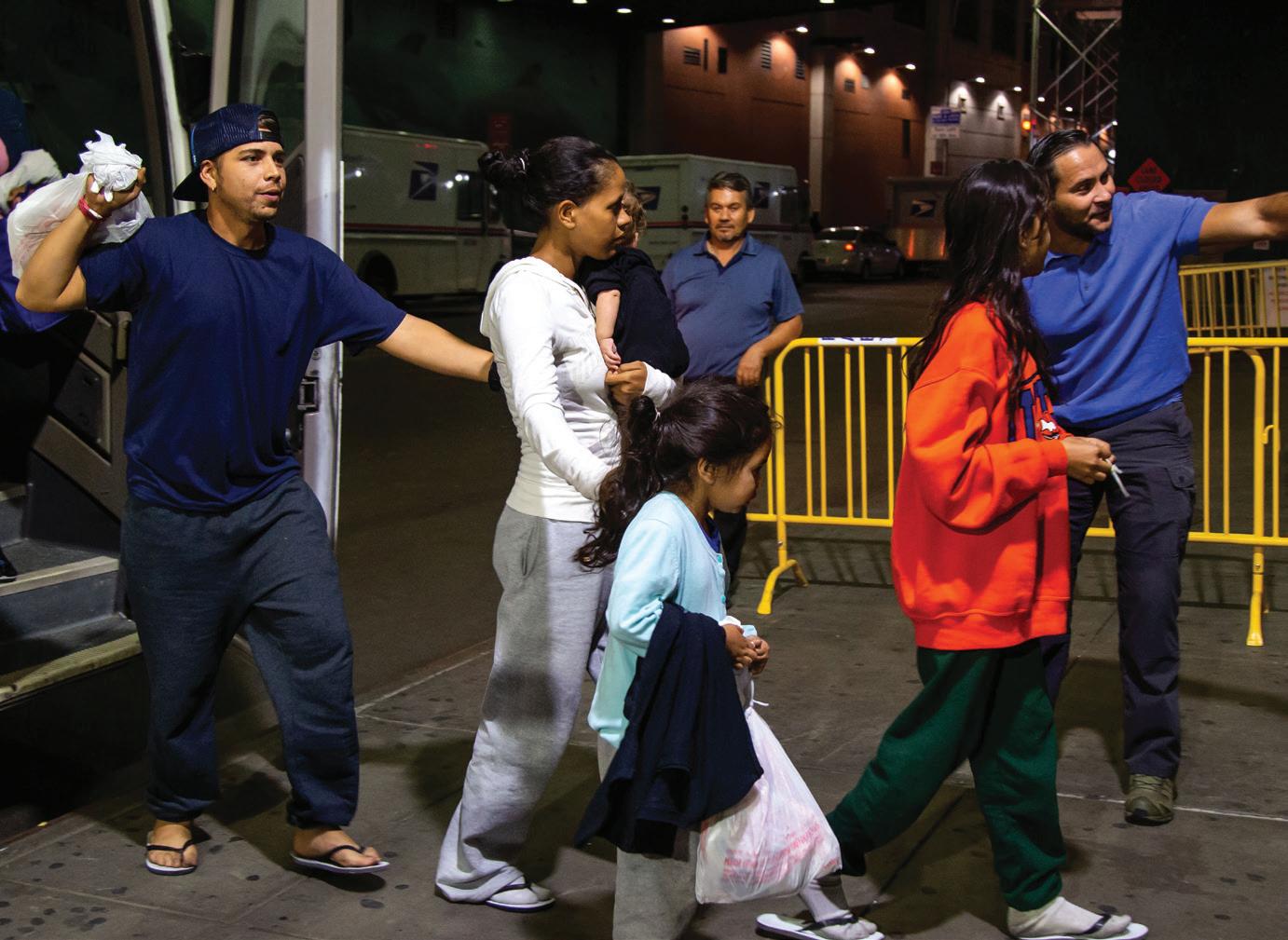
As a result of a 1979 lawsuit, New York City—unlike other large U.S. cities—was required to provide shelter to people without it.
The Rhodebeck Fund for the Homeless, established in 1989, allowed The Trust to address short- and long-term solutions. Richard Rhodebeck, a Brooklynborn insurance executive, and his wife, Mildred, created the fund with $285,000. Because of prudent
investments, it has made $660,000 in grants over the years to local nonprofits. Like the Rhodebecks, many other generous New Yorkers have established funds at The Trust to address homelessness, but more support is needed.
PROVIDING STABLE HOUSING
“Because the city is facing enormous needs and The Trust’s resources are limited, our focus is on the big picture,” said Shawn Morehead, vice president for grants. “When it comes to housing, that means expediting access to appropriate housing and improving services to stabilize families.”
As the city has grown, affordable housing development hasn’t kept pace. In one innovative approach, Breaking Ground partnered with for-profit developers to take advantage of city incentives to include 20 percent affordable housing in market-rate buildings. The partnerships led to 19 development projects.
There is also a dire need for supportive housing, which provides affordable, independent housing matched with comprehensive services for those facing mental illness, abuse, or addiction. Using several Trust grants, the Supportive Housing Network of New York led a campaign that resulted in city and state commitments to create 35,000 supportive apartments over 15 years.
“Supportive housing is now widely accepted as the most humane and effective approach to resolving a seemingly intractable social problem for people who have the greatest barriers to obtaining and maintaining housing,” said Network Executive Director Pascale Leone. “It allows people to rebuild their lives in the community. We feel it is the ultimate efficiency in helping get people off the streets and out of shelters.”
Recalling his days before supportive housing, Broome said, “I was asleep for like five years. I
Grants Newsletter | Fall 2022 5
NEW REFUGEES: Migrants arrive at the Port Authority in buses from the U.S. southern border. The majority are fleeing the political and economic crisis in Venezuela. Photo by Xinhua/Shutterstock
was doing drugs. I was an alcoholic. I lost focus on my perspective, my identity. I felt sort of robotic.”
One day, a Breaking Ground team member who had encouraged him to apply approached him on the street and said: “Daniel, are you ready to go home?”
When he arrived at his new home, he was asked what he’d do first. “Scuba diving” in his new bathtub, he joked. The next day the city was hit with a major snowstorm, and Broome looked out the window, convinced he would not have survived.
In the six years since, he has encouraged others to seek assistance. He said, “I’ve had people who told me: ‘I wouldn’t be in a program if it hadn’t been for you. I would have been in a lot of trouble.’ It’s an emotional reward to hear someone say they appreciate your help. I’m giving back something that was given to me.”
Our Long Island Community Foundation also is creating supportive housing. Its grants to Wyandanch Homes and Property Development Corporation are helping people achieve economic stability with housing that offers career counseling and financial literacy programs.
In addition to making grants to spur affordable housing, The Trust teamed with SeaChange Capital Partners to make low- or no-interest loans available to nonprofits. With our investment in the New York Pooled PRI Fund, SeaChange made a predevelopment loan to Children’s Village and Community League of the Heights to support the expansion of the Inwood Library that will include affordable housing, classrooms, and a community center.
STREAMLINING SERVICES
Trust grantmaking has made services more effective by cutting red tape. Coordinated Behavior Care will bring together service providers and government to streamline the
system so people with mentalhealth and substance-use needs can get into empty supportive apartments. Similarly, The Public Policy Lab will help the city improve the Section 8 rent voucher system— where delays have led landlords to turn away Section 8 tenants. While Westchester is considered a wealthy enclave, nearly 90 percent of its lower-income earners pay more than 30 percent of their income toward housing. To help them, our Westchester Community Foundation made grants to Community Voices Heard for its grassroots advocacy to improve affordable housing.
HELPING HIGH-RISK GROUPS
“A key investment,” said Morehead, “is working proactively with the groups who are more likely to become homeless.”
Two high-risk groups—young people and older adults—are separated by decades but both have limited incomes and employment opportunities. To help, Streetlives is creating a phone app for young people so they can read peer-
written reviews about places offering shelter, food, or healthcare. And LiveOn NY is advocating for affordable housing for older adults, whose fixed incomes cannot always meet their basic needs—a pressing concern given that 4,000 are in shelters, and many wait up to 10 years for affordable housing.
IMPROVING THE ODDS
We believe that though these tens of thousands of people are unhoused, they do have a home: New York. As we have for nearly 100 years, The Trust will channel the compassion of generous New Yorkers to improve the quality of life for all our neighbors, particularly those who have the least.
“There were several times I almost lost my life out there,” said Broome, who is now affectionately called “The Mayor” of his building. “I’m looking at it like I’m living on my second chance and I’m not taking the chance of seeing if I got another. I’m forever grateful for the opportunity to get my life back together.” n
THREE WAYS YOU CAN HELP NEW YORKERS EXPERIENCING HOMELESSNESS:
• Be an influencer! Share this story with friends and family and talk about it. You can find it in the Newsroom of our website.
• Donate to an organization listed in our giving guide, which you can find in our Newsroom or by scanning this QR code.
• Leave a legacy of caring by establishing a permanent fund with us. Contact giving@nyct-cfi.org to learn more.

nycommunitytrust.org 6
SPOTLIGHT
Repairing the system for immigrants
CAMILLE MACKLER
Camille Mackler is the executive director and co-founder of Immigrant ARC, a community of legal advocates as well as an immigration-law training and policy institute. Started as a project of the New York Immigration Coalition in 2017 in reaction to the presidential executive order banning visitors from seven predominantly Muslim countries, it became independent in 2020.
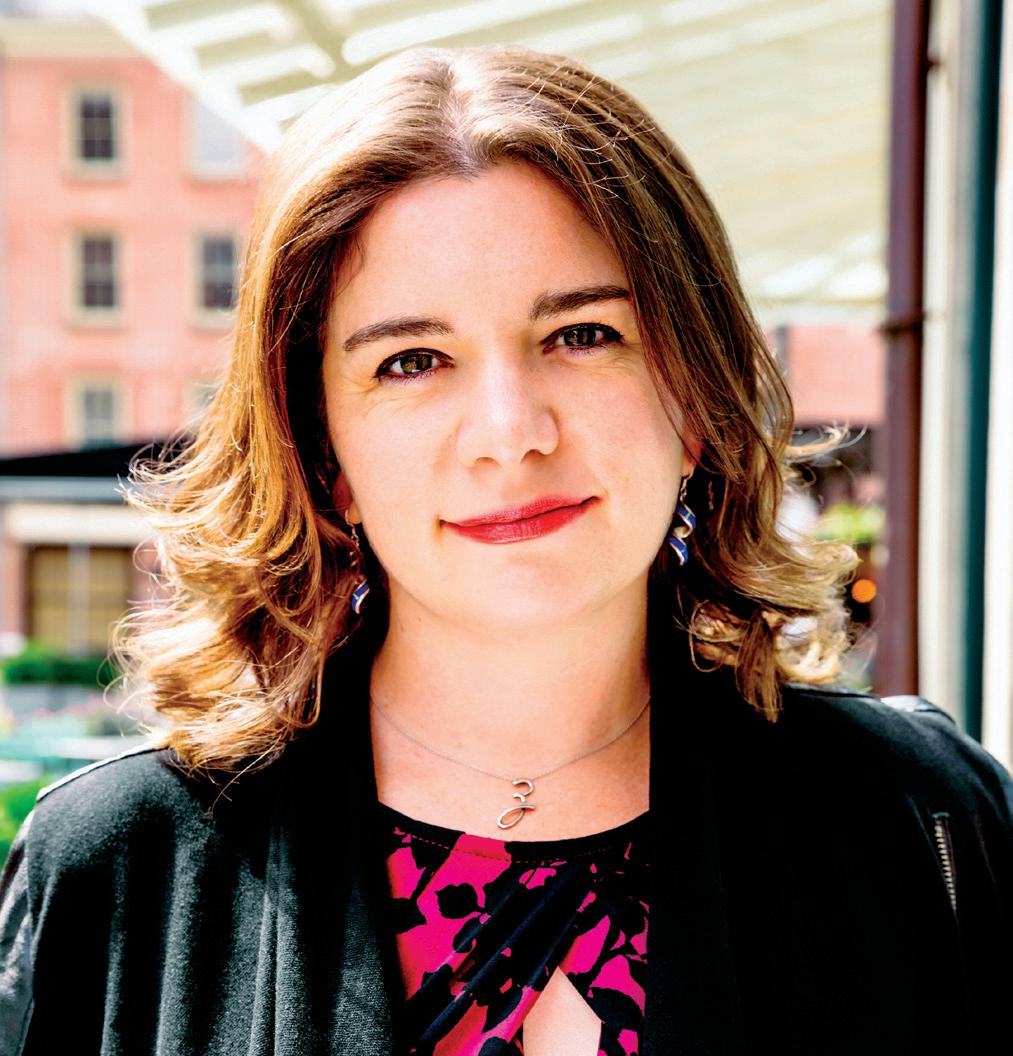
“The majority of migrants from the southern border stepping off buses at the Port Authority right now are coming to our city with just the clothes on their backs and no one waiting for them. Largely political and economic refugees from Venezuela, their cell phones, passports, and even extra clothing were taken away by U.S. immigration officials.
In my work over the years as an immigration lawyer, I realized that I could make the biggest difference by working to change the way that our
country, state, and city help immigrants. America is seen as a beacon of hope, but that beacon is broken. My job is to bring together 80 legal service providers throughout New York State to fix this system.
How do we do it? For starters, we make sure the people who work day in and day out to help newcomers have a seat at the policymaking table. The New York Community Trust is currently funding our work to do just that, and make sure federal immigration regulations reflect the needs of our city’s communities. As the city’s community foundation, it understands that we need to put our faith in these service providers, and lift up their recommendations on how to improve regulations so they are more fair and humane. This includes reducing fees to apply for benefits, and addressing the causes of immigration court’s case backlog and processing delays.
Success for me means working my way out of a job. My goal is to build a system that allows immigrants to create lives for themselves. You shouldn’t need a lawyer to get protection and safety, to reunite with a family, or to take advantage of a job opportunity. The system is designed to be difficult to navigate. I see people try on their own and fail because it is just too complicated.
If we can fix this system, I will happily retire and open a café in the south of France. But until then, I am dedicated to making life better for people who are just looking for a chance to lead a better life.” n
Grants Newsletter | Fall 2022 7 FROM THE DESK OF...
Success for me means working my way out of a job. My goal is to build a system that allows immigrants to create lives for themselves.”
When the donor-advised fund is the gift
STUART CORNFELD
Stuart Cornfeld, who produced several films, including Zoolander and Starsky & Hutch, created 10 donor-advised funds through his will for friends and family. Photo by Alex Berliner®Berliner Studio/BEImages
Giving is a joy for the giver. One powerful way to multiply that joy is to give someone a donoradvised fund, or DAF, to celebrate a birthday or wedding, or honor a loved one who has passed. This giving season we’re taking a look at how one man’s generosity came to life through gifts to charity that were also a tribute to friendship.
option—you can set up funds for friends and family today as well.
Scan this QR code to watch a short video we produced that will tell you what you need to know about DAFs in three minutes.

When noted film producer Stuart Cornfeld died in 2020, he left ten of his friends and family a memorable gift in his will. With a portion of his residuary estate left to The New York Community Trust, he surprised them with donor-advised funds he had established in their names. Some were family or lifelong friends. Others were screenwriters, actors, and comedians he had met during his career. Recipients said these gifts were a powerful testament to their friendship and served as a regular reminder of everything they loved about Stuart. They’ve spoken about what a pleasure and honor it is to give money away to organizations they care about in Stuart’s memory, and some have added their own contributions to his to amplify their fund’s impact.
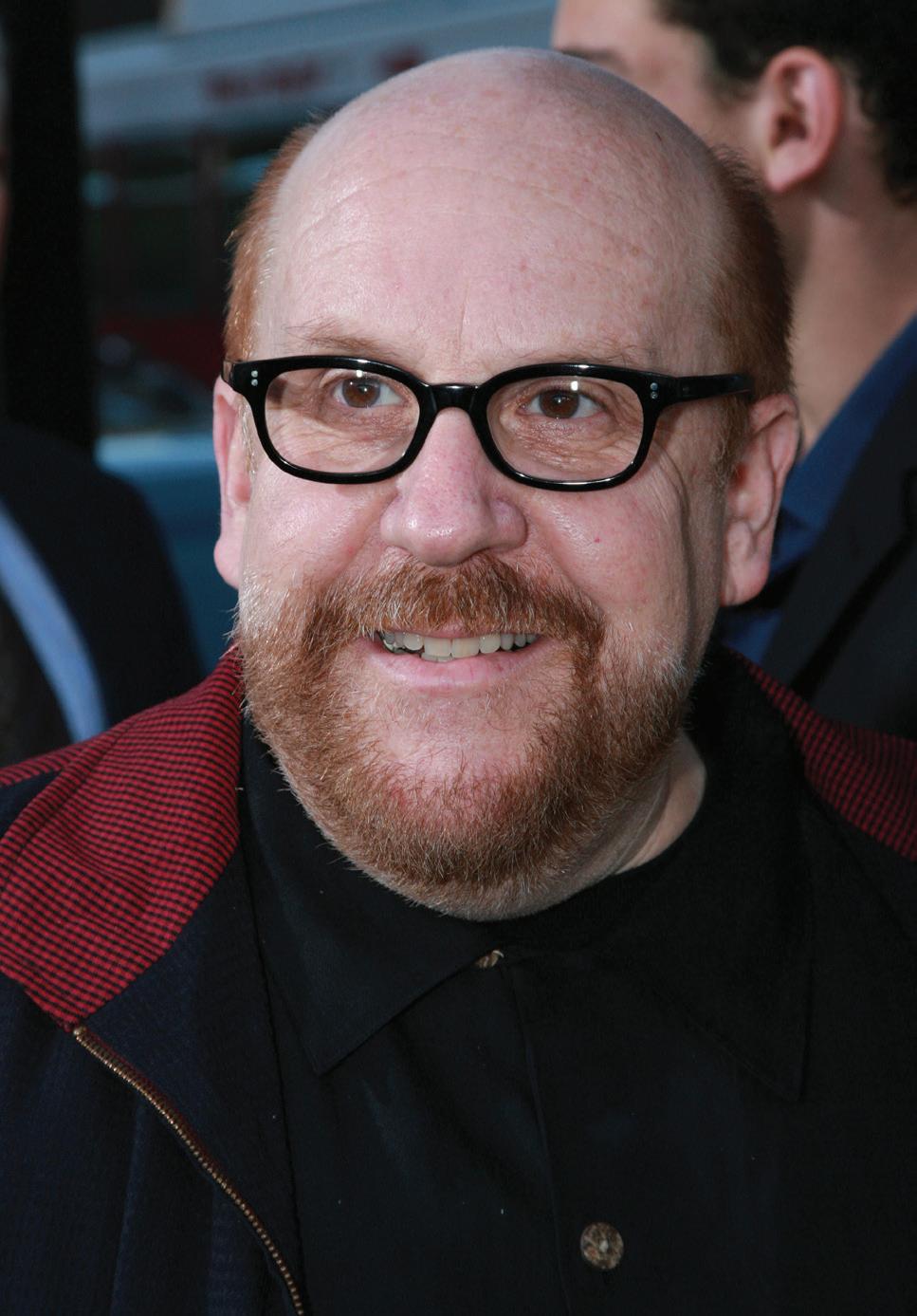
Stuart’s creative approach to legacy giving offers an inspiring blueprint for how to leave an enduring and meaningful gift for those you love that helps others at the same time.
Of course, creating funds through your estate in this way is just one
When you create a new donoradvised fund for a friend or loved one and turn the reins over to them, they can make grants to the charities of their choice. Many of our donors have done this for their children and grandchildren—it’s a wonderful way of continuing a family tradition of generosity and, at the same time, allowing the younger generations to develop their own charitable priorities and execute these independently.
In joining the community of Trust donors, they will have the support of our staff and access to free donor briefings and other events.
You can set up a new fund in this way through a transfer from your existing fund, or through a new contribution to The Trust, using a variety of assets ranging from appreciated securities to an old-fashioned paper check. Please note that our donor-advised funds should exist for at least five years and maintain a balance of at least $5,000.
Once the fund is set up, we’ll introduce the new advisors to everything they need to know to get started making grants. To discuss your options and learn more, contact John Oddy, vice president of donor relations, at jjo@nyct-cfi.org or (212) 686-2564. We look forward to hearing from you! n
YOUR PHILANTHROPY nycommunitytrust.org 8
IN WESTCHESTER
Advocates press for better bus service
Public-transit customers typically ride together, but they do not typically work together to call for improvements in service. With a grant from the Westchester Community Foundation, the Tri-State Transportation Campaign is building riders’ collective voice.
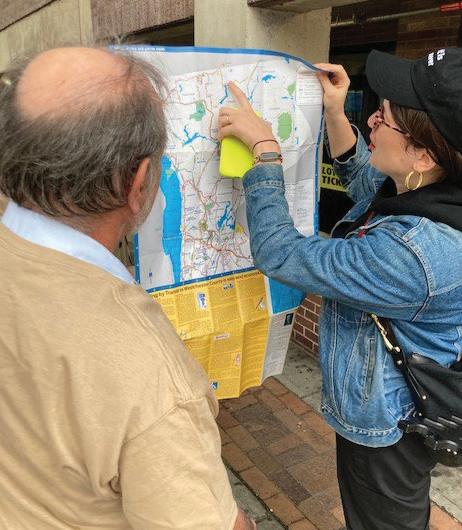
As the county’s contract for bus service, currently run by Liberty Lines, is up for renewal in 2023, Tri-State is educating and organizing riders to strengthen the case for important service improvements.
A better bus system can benefit the environment, make streets safer for pedestrians, and provide a lifeline for low-income residents who need reliable, affordable options to get to workplaces, shopping, and medical appointments.
ON LONG ISLAND
Preparing young people for careers
To improve the career prospects for young people, the Long Island Community Foundation made a grant to the Viscardi Center for an alternative education program for high school students who are at risk of not completing their studies.
The program, known as PROSPER (People Reaching for Opportunities to Succeed Personally, Educationally, and Realistically), is a partnership between the Center and high-need school districts. The partnership began in 1997 and has worked with more than 1,000 high school students, mostly Black and Latinx young people from low-income families. Students in the program spend half of each school day visiting local colleges and workplaces to build academic, career, and life skills. In addition, Viscardi will help students find summer jobs and navigate the college application process.
Ninety-eight percent of students completing
Tri-State created a survey for BeeLine riders so their views could be considered as the county evaluates and rewrites the new contract with an eye toward improving service. In the survey, riders expressed the need to increase the frequency of bus service, operate longer hours, create more Metrocard refill stations, improve accessibility, and make BeeLine more responsive to customers’ concerns.
With a recent grant, Tri-State continues to organize riders and support their advocating for better service. A Tri-State analysis found that Westchester pays more for less service than other localities, which is a result of there being no competitive bidding process. n
the PROSPER program attend college, enroll in vocational training, enlist in the armed services, or find a job—a much higher percentage than students in similar situations locally. Because of the pandemicrelated school closures, Viscardi offered its PROSPER program online to more than 60 high school juniors and seniors from Freeport, Westbury, and Brentwood schools, then moved to hybrid learning with students receiving laptops and access if needed. n

Grants Newsletter | Fall 2022 9 OUR AFFILIATES
RIDERS SPEAK UP: Bus advocate Michael Ditkoff and Jaqi Cohen, Tri-State’s director of climate and equity policy, discuss how bus routes in Westchester have not changed in 30 years.
CAREER EXPLORATION: A group of high schoolers visit a Covanta waste incineration facility on Long Island and discuss job opportunities and skill requirements.
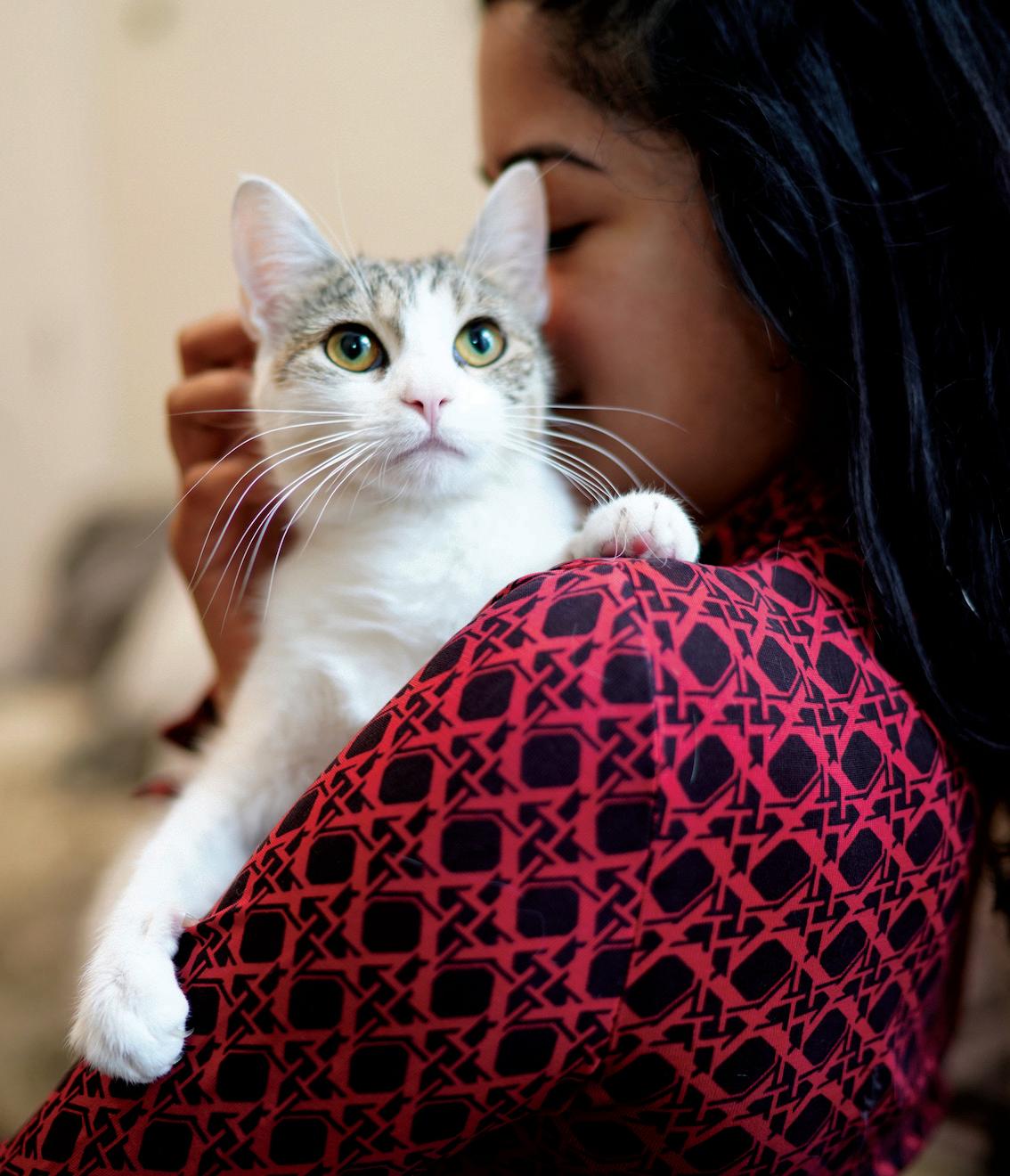
nycommunitytrust.org 10 FEATURE STORY
CAT CARE: A Trust grant to Flatbush Cats is supporting the development of a spay and neuter clinic.
Caring for furry and flying New Yorkers
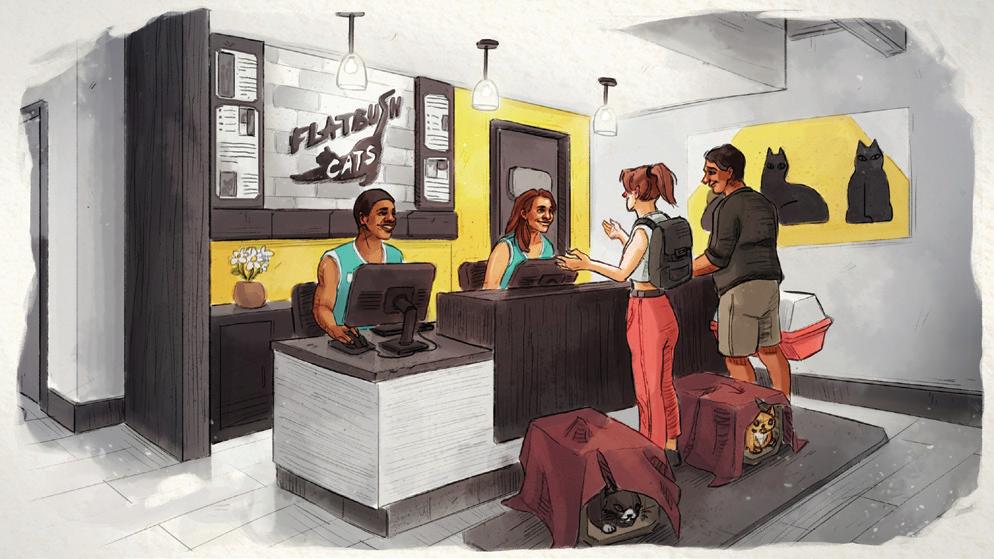
Amid the “concrete jungle” of New York City, there are many wild and domesticated animals that call this urban habitat home. The Trust is committed to supporting the welfare of pets, such as cats and dogs, as well as protecting animals in the wild and their habitats.
Flatbush Cats received a grant from The New York Community Trust to prepare for the opening of Brooklyn’s first affordable, high-capacity spay and neuter clinic. The organization recognizes that kittens born outdoors frequently do not make it past their first few months of life, so the team at Flatbush Cats provides the vital services to address this kitten crisis. This clinic saves cats’ lives by providing more accessible veterinary care to cat owners and reducing the outdoor cat population by rescuing stray cats from the streets and finding them suitable homes.
public lands managed by agencies across the five boroughs.
Bees are essential to the environment and play a large role in food production. The Trust is supporting the Bee Conservancy to protect bees and other pollinators in the metropolitan area. The Bee Conservancy notes that there are roughly 4,000 native bee species in North America, with more than half of these species in decline, and one in four of these species at risk of extinction. It is even more notable that a third of the food that people consume contains a plant that was pollinated by bees, according to the Bee Conservancy.
“Our latest round of funding empowers us to work with a range of sub-agencies of the Port Authority of New York and New Jersey to establish pollinator corridors across their sites,” said Rebecca Louie, the executive director of the Bee Conservancy. “This ongoing, vital work will improve local ecosystems and biodiversity.”
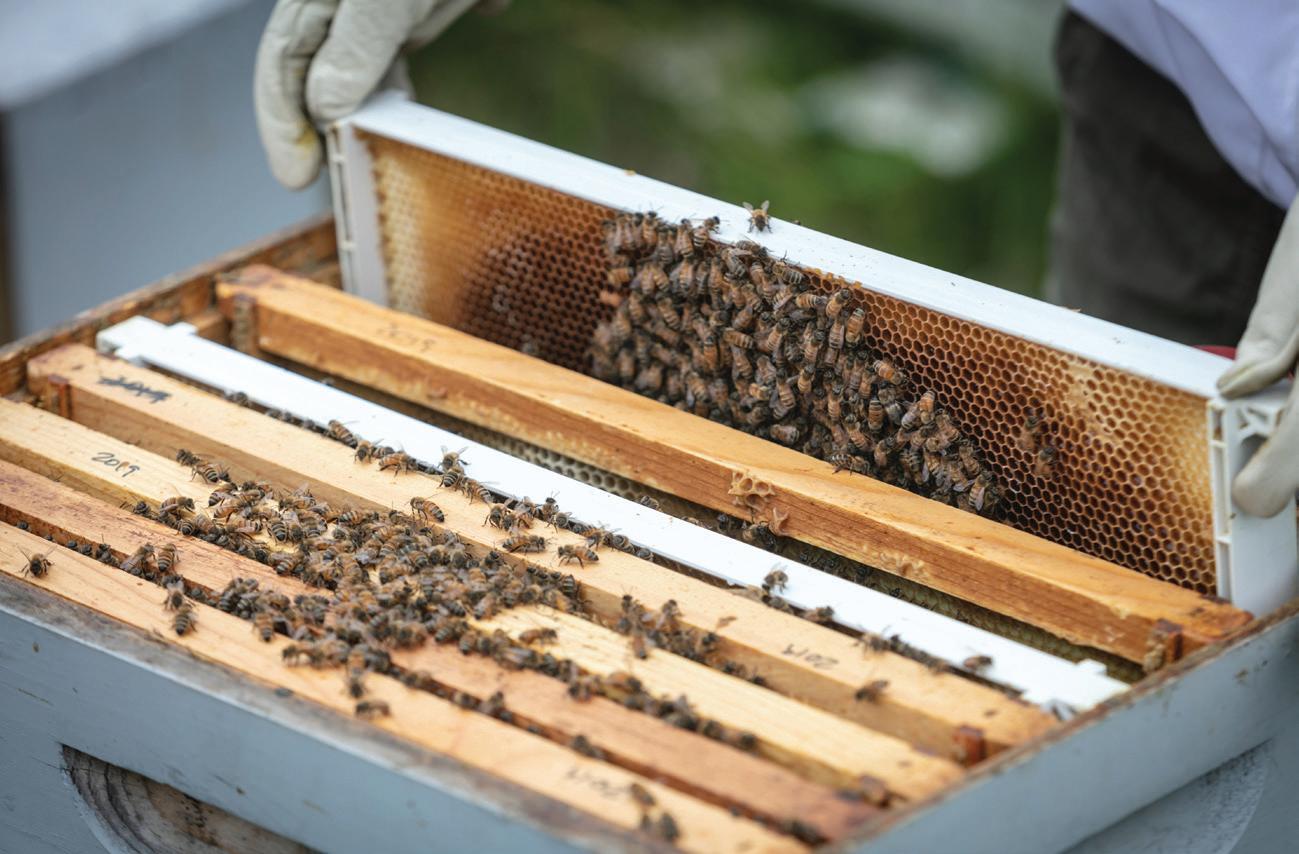
Through this partnership, the Conservancy hopes to develop model practices that can be applied to
Similarly, the city’s wild birds are facing challenges and several nonprofits are working to help them, such as the New York City Audubon Society, NYC Plover Project, and the Wild Bird Fund. The New York City Audubon Society is promoting changes in building design and operation that will reduce the incidences of birds colliding with buildings. The NYC Plover Project is using our grant to protect the piping plover, a shorebird that nests in dunes close to the water, making it particularly vulnerable to human disturbance, coastal storms, and erosion. The Wild Bird Fund is using our grant to open a Brooklyn site that will provide emergency services for injured birds, which are vulnerable to collisions with windows, automobile accidents, pet attacks, pollutants, and litter.
The Trust also is helping to start a promising new initiative locally, Dogs Trust USA, which is replicating a successful program from the United Kingdom that will offer canine behavioral training in partnership with three New York City animal rescue agencies. In addition, The Trust is supporting the Wildlife Conservation Society, which is protecting marine wildlife in New York waters through research, public education, and advocacy.
To help the city’s small animal-welfare nonprofits and volunteer groups, The Trust made a grant to the Animal Defense Partnership to provide free legal services to support their expansion, with a particular focus on animal rights groups led by people of color. n
Grants Newsletter | Fall 2022 11
A PLACE FOR POLLINATORS: In addition to protecting corridors for pollinators, the Bee Conservancy helps bees propagate using boxes like the one shown above.
RESCUE CENTER: Our grant is helping Flatbush Cats plan for programs in their new facility, rendered above.
909 Third Avenue, 22nd Floor New York, NY 10022 nycommunitytrust.org
Address Service Requested
Connect with us!

We’d like to hear from you. Please contact us with questions or comments: (212) 686-0010 or info@nyct-cfi.org
A champion for animals
Marjorie Isaacs was devoted to the arts, people, and animals. She danced professionally for George Balanchine and performed at the 1939 World’s Fair and at Radio City Music Hall. She also volunteered for a number of nonprofits, including the Hudson River Museum and the Paul Taylor Dance Company.
In her will, she created a fund in The New York Community Trust devoted to helping animals, particularly those that are abused or otherwise in danger. Read more inside on pages 10-11 about the birds, bees, and other creatures we’re helping thanks to her generosity. n
WILDLIFE: New York’s beaches are home to the piping plover, a bird our grants are protecting thanks to the generosity of our donors.

Nonprofit Org. U.S. Postage PAID Permit No. 1534 Hackensack, NJ
Champion the causes you care about. For generations.
Contact us at (212) 686-0010 x363 or giving@nyct-cfi.org to jumpstart your charitable legacy today.
Thanks, Marjorie!
BEACH
















